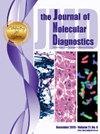BCL2-和bcl6重排阳性滤泡性淋巴瘤突变谱的比较。
IF 3.4
3区 医学
Q1 PATHOLOGY
引用次数: 0
摘要
我们最近报道了伴有bcl6重排(R)的滤泡性淋巴瘤(FL)与有利的无进展生存相关,而BCL2-R和BCL2-6-R病例与疾病进展相关。然而,病理机制尚不清楚。本研究分析了31例FL的突变景观和免疫微环境,其中16例为BCL2-R, 11例为BCL6-R, 4例为BCL2-6-R。该方法包括内部新一代靶向测序(NGS) 168个与侵袭性b细胞淋巴瘤和FL相关的基因,全基因组拷贝数改变微阵列(OncoScan),以及免疫微环境的免疫组织化学,重点是m2样肿瘤相关巨噬细胞,调节性T淋巴细胞和PD-1 (PDCD1)阳性滤泡T辅助细胞。由此产生的突变谱与先前报道的传统FL系列相一致,该系列在CREBBP、KMT2D、TNFRSF14、STAT6和CD36中具有频繁突变。此外,BCL6-R病例存在ARID1B、ARID5B和RHOA突变;其他基因(如OSBPL10、PTPRD、ATM和HLA-B)的低频率突变、6q缺失和无疾病进展。与BCL6-R病例相比,BCL2-R和BCL2-6-R病例发生EZH2突变,18号染色体拷贝数增加,部分病例出现疾病进展。免疫微环境具有异质性;然而,BCL6-R病例表现出更高的CSF1R-和CD85A (LILRB3)阳性细胞的浸润。综上所述,与BCL2-R相比,FL与BCL6-R在突变谱和免疫微环境方面存在一定差异。本文章由计算机程序翻译,如有差异,请以英文原文为准。
Comparison of the Mutational Profile between BCL2- and BCL6-Rearrangement Positive Follicular Lymphoma
It was recently reported that follicular lymphoma (FL) with BCL6 rearrangement (R) is associated with favorable progression-free survival, whereas BCL2-R and BCL2-6-R cases are associated with disease progression. However, the pathologic mechanism remained unexplored. This study analyzed the mutational landscape and immune microenvironment of 31 FL cases, including 16 BCL2-R, 11 BCL6-R, and 4 BCL2-6-R FL cases. The method included an in-house next-generation targeted sequencing panel of 168 genes associated with aggressive B-cell lymphoma and FL, whole genome copy number change microarray (OncoScan), and immunohistochemistry for the immune microenvironment focused on M2-like tumor-associated macrophages, regulatory T lymphocytes, and programmed cell death protein 1 (PDCD1; alias PD-1)–positive follicular T helper cells. The resulting mutational profile was compatible with a previously reported conventional FL series featuring frequent mutations in CREBBP, KMT2D, TNFRSF14, STAT6, and CD36. Moreover, BCL6-R cases had mutations in ARID1B, ARID5B, and RHOA; low frequency of mutations in other genes, such as OSBPL10, PTPRD, ATM, and HLA-B; 6q loss; and absence of disease progression. In comparison with BCL6-R cases, BCL2-R and BCL2-6-R cases had mutations in EZH2, chromosome 18 copy number gain, and disease progression in some cases. The immune microenvironment profile was heterogeneous; however, BCL6-R cases demonstrated higher infiltration of colony-stimulating factor 1 receptor– and leukocyte immunoglobulin like receptor B3 (LILRB3; alias CD85a)–positive cells. In conclusion, compared with BCL2-R, FL with BCL6-R exhibited some differences in mutational profiles and immune microenvironment.
求助全文
通过发布文献求助,成功后即可免费获取论文全文。
去求助
来源期刊
CiteScore
8.10
自引率
2.40%
发文量
143
审稿时长
43 days
期刊介绍:
The Journal of Molecular Diagnostics, the official publication of the Association for Molecular Pathology (AMP), co-owned by the American Society for Investigative Pathology (ASIP), seeks to publish high quality original papers on scientific advances in the translation and validation of molecular discoveries in medicine into the clinical diagnostic setting, and the description and application of technological advances in the field of molecular diagnostic medicine. The editors welcome for review articles that contain: novel discoveries or clinicopathologic correlations including studies in oncology, infectious diseases, inherited diseases, predisposition to disease, clinical informatics, or the description of polymorphisms linked to disease states or normal variations; the application of diagnostic methodologies in clinical trials; or the development of new or improved molecular methods which may be applied to diagnosis or monitoring of disease or disease predisposition.

 求助内容:
求助内容: 应助结果提醒方式:
应助结果提醒方式:


